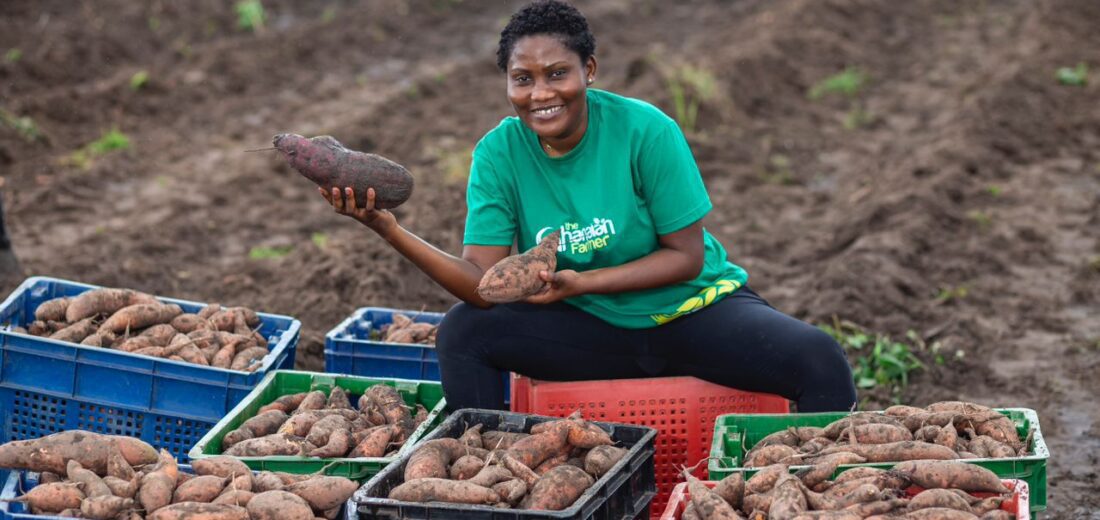
Empowering Ghanaian Farmers: The Woman Behind the Movement
In a region where women often face barriers to entry in the male-dominated agricultural sector, a woman is determined to change the narrative. With unwavering passion and a drive to make a difference, she has embarked on a mission to revolutionize farming practices and empower local communities.
As a journalist intrigued by her remarkable journey, I set out to uncover the secrets behind her success, what motivates her to break barriers in an industry resistant to change, how she is leveraging on technology to overcome challenges and improve the lives of local farmers?
In recent years, Ghana has witnessed a remarkable transformation in its agricultural landscape, with an increasing number of women venturing into the sector. This shift marks a significant departure from traditional gender roles and presents exciting opportunities for economic growth, food security, and sustainable development.
Enyonam Manye Adjetey is the Chief Executive Officer of ‘Count on Crops’. she leads a dedicated team of professionals committed to driving positive change in the agricultural sector. From organizing community workshops to launching educational campaigns, Count on Crops is at the forefront of empowering farmers with knowledge, resources, and opportunities for growth.
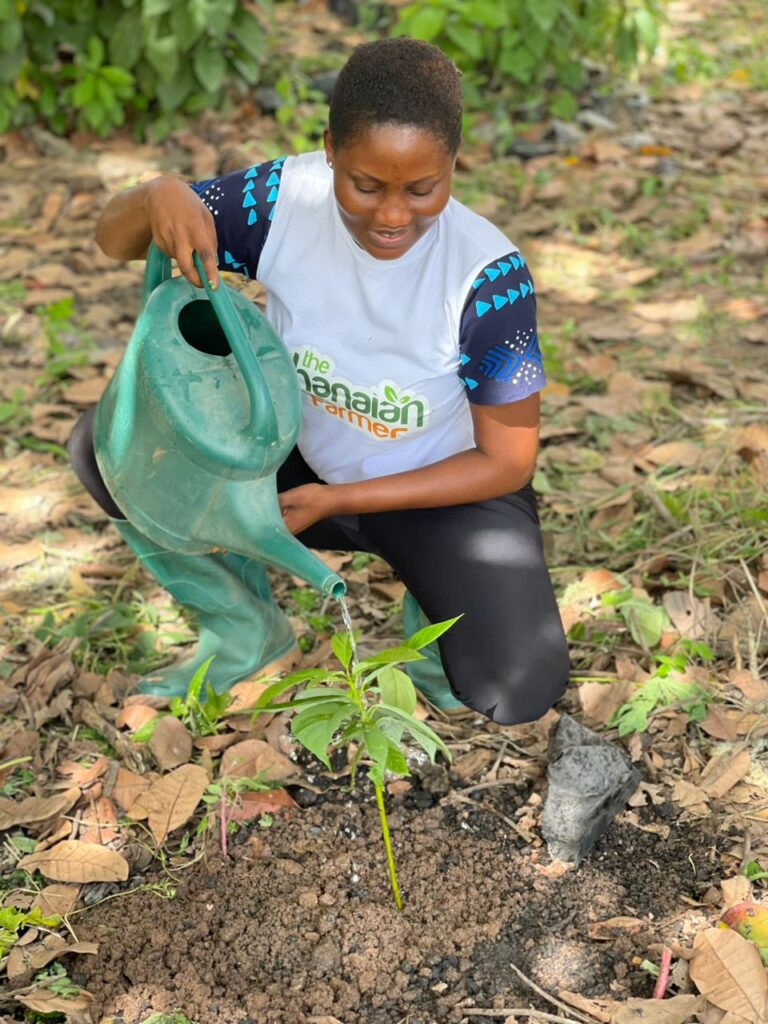
Enyonam is determined to change the narrative of females in Agriculture.
Through innovative projects such as mobile farming apps and cooperative networks, Enyonam is revolutionizing the way farmers engage with technology and access market information. She graciously welcomed me to her office, where she shares her inspiring story.
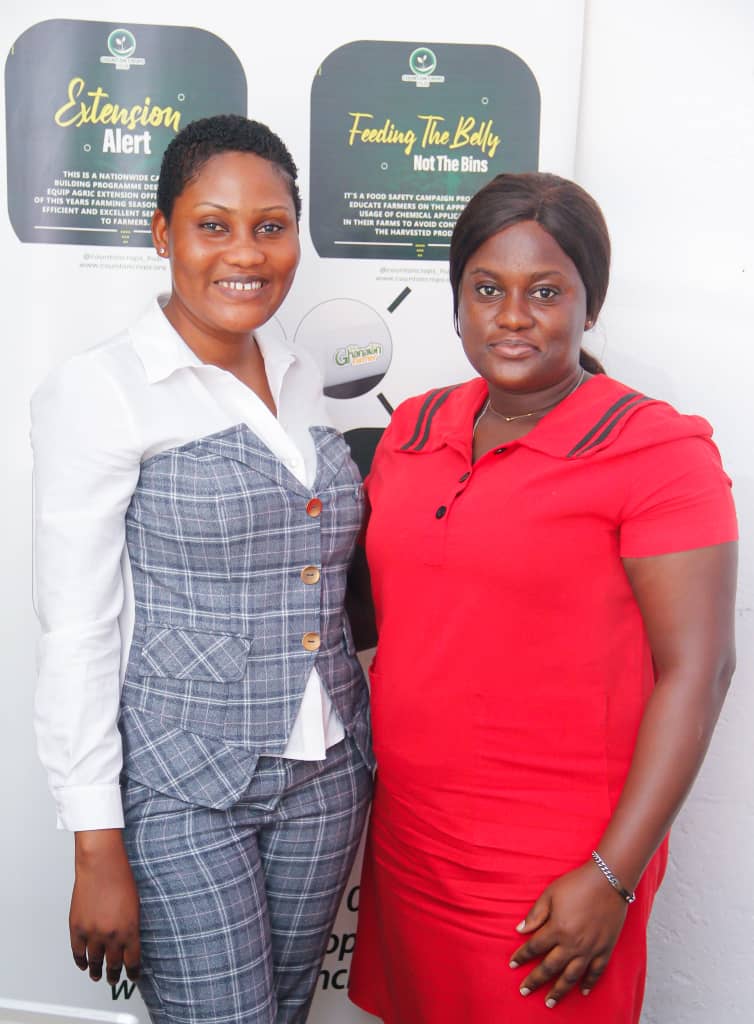
Enyonam’s (Left) vision is to encourage young people into Agriculture.
Agricultural Landscape in Ghana:
Agriculture serves as the backbone of Ghana’s economy, employing over half of the population and contributing significantly to GDP. The World Bank reports that agriculture accounts for approximately 18.9% of Ghana’s Gross Domestic Product (GDP) in 2020. This demonstrates the significance agriculture is contributing to the growth and development of the nation.
The sector is characterized by diverse activities, including crop cultivation, livestock rearing, aquaculture, and agro-processing. Smallholder farming predominates, with subsistence and commercial farming coexisting across the country’s varied agro-ecological zones.
Women’s Role in Agriculture:
Historically marginalized, women in Ghana are increasingly breaking barriers and actively engaging in agricultural activities. From farm labor to entrepreneurship, women contribute at every stage of the agricultural value chain. They play a crucial role in crop production, tending to fields, planting, and harvesting crops. Additionally, women are involved in livestock management, poultry farming, and aquaculture, demonstrating versatility and resilience in diverse agricultural pursuits.
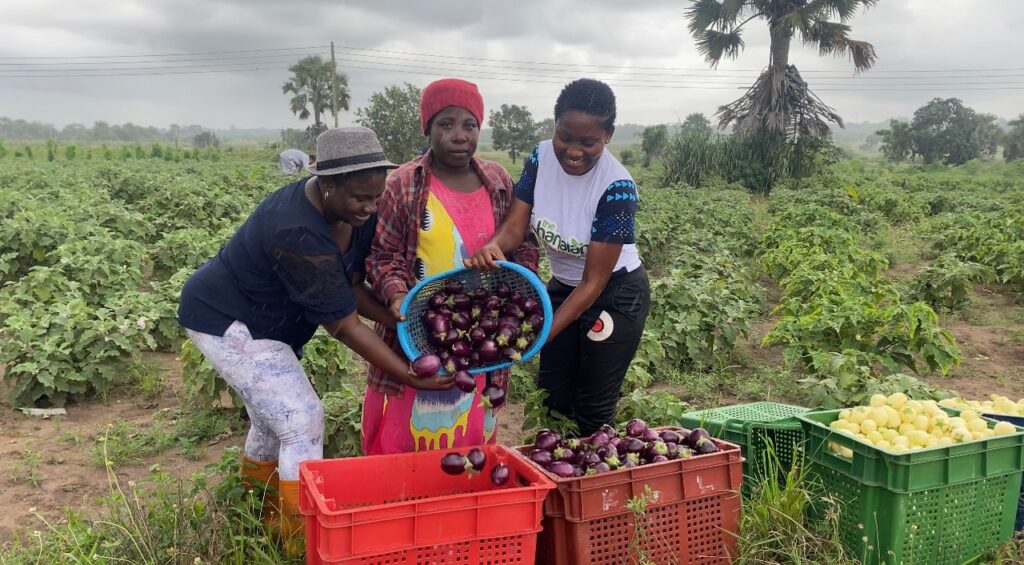
Women contribute at every stage of the Agricultural value chain.
Overcoming adversity
In the heart of Ghana’s lush countryside, where agricultural traditions run deep but female participation remains sluggish, Enyonam Manye Adjetey stands out as a beacon of innovation and resilience. As the sun rises each day, she is already hard at work, pioneering a new era of farming that challenges stereotypes and transforms livelihoods.
How the journey began:
Raised in a farming family, Enyonam developed a deep connection to the land from a young age. However, she soon realized the limitations imposed on women in the agricultural sector. Determined to challenge these norms, she embarked on a journey of discovery, seeking innovative solutions to age-old problems.
“It all started in 2020 during COVID-19 pandemic. The whole world came to a standstill. I became jobless, and as a trained journalist, I had to think of a way to survive and then came the concept of venturing into agriculture” – she said.
And she narrates how the Vice President of Ghana, Dr. Mahamudu Bawumia, came to her rescue in purchasing more equipment for her television programme. Upon witnessing my endeavors to enhance agriculture in the country, Dr. Mahamudu Bawumia, the Vice President of Ghana, expressed his appreciation. Approaching him, he pledged, “I will provide you with all the necessary equipment to inspire youth participation in agriculture and challenge the misconception that females aren’t suited for commercial farming.” His words left me momentarily wondering if I was dreaming.
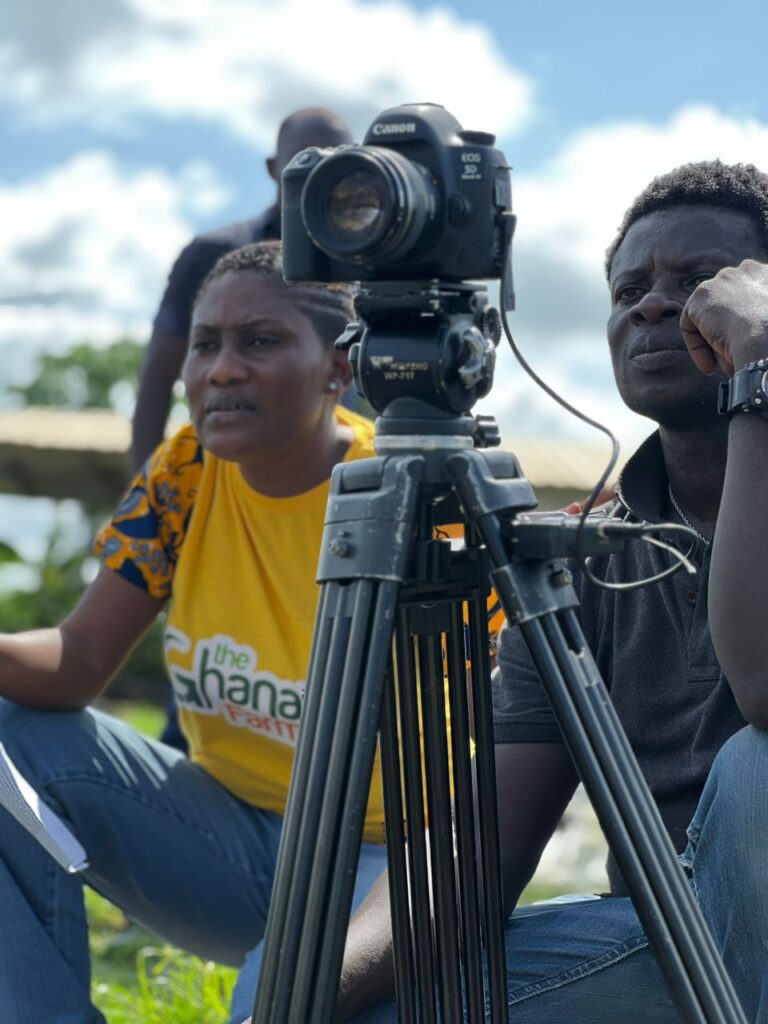
Enyonam wants media investments to project Agric stories.
“I met him at the Accra Digital Center for a Youth in Entrepreneurship programme where he was one of the keynote speakers. I was given the opportunity to ask a question and that was where I appealed for his support which he honored it”. Not so long after, Enyonam realized that Agriculture was rarely talked about in the media. The only time the media talks about Agric was only when there was a problem, hence she ventured into telling the positive stories of Ghanaian farmers.
“Being a farmer’s daughter, my father was a commercial farmer who produced rice, chili pepper, habanero and did a bit of fish farming in Togo. There were no pictures or videos to show his contributions to Agriculture and food security hence, the reason to create and develop my project: “The Ghanaian Farmer”.
Enyonam explains that the Ghanaian Farmer was birthed to tell stories about farmers, educate people about agriculture with the opportunities that comes with it, changing people’s orientation about the myths in the sector and attracting more young people into agriculture. She added that, “we help find markets for farmers to make their journey into farming easy. We buy their goods, re-package and sell. And lastly, we cultivate potato for export to countries like the UK, USA, Netherlands, France and India. The Ghanaian Farmer is shown one of Ghana’s most watched television platform, Joy Prime.
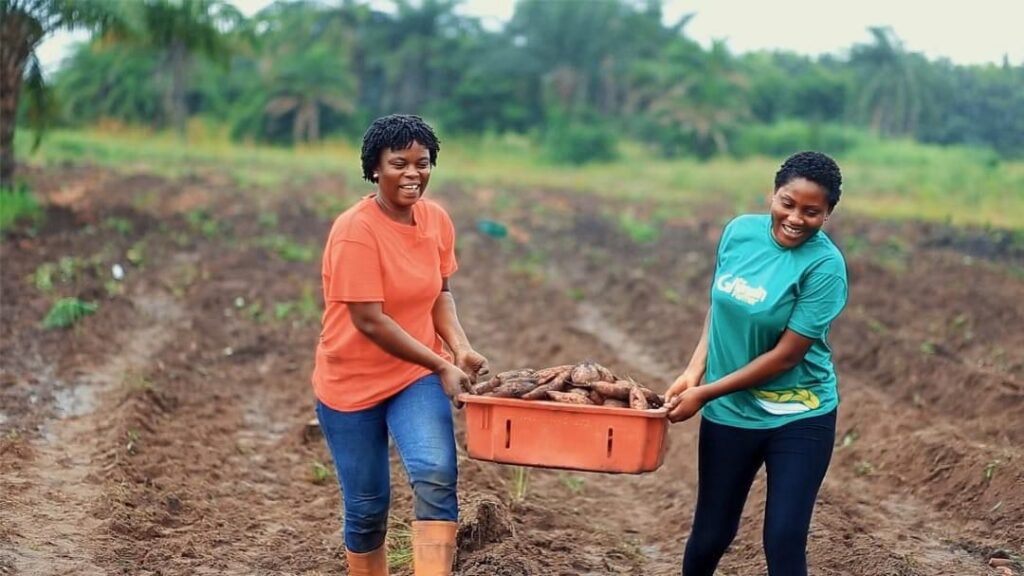
Her vision is to address SDG 2 to improve Agriculture.
The Sustainable Development Goal SDG 2 seeks to “end hunger, achieve food security, improve nutrition, and promote sustainable agriculture”. Enyonam tells the story of farmers looking at the benefits of farming, food security, creating of jobs, while highlighting their plights and contributions to the development of the nation.
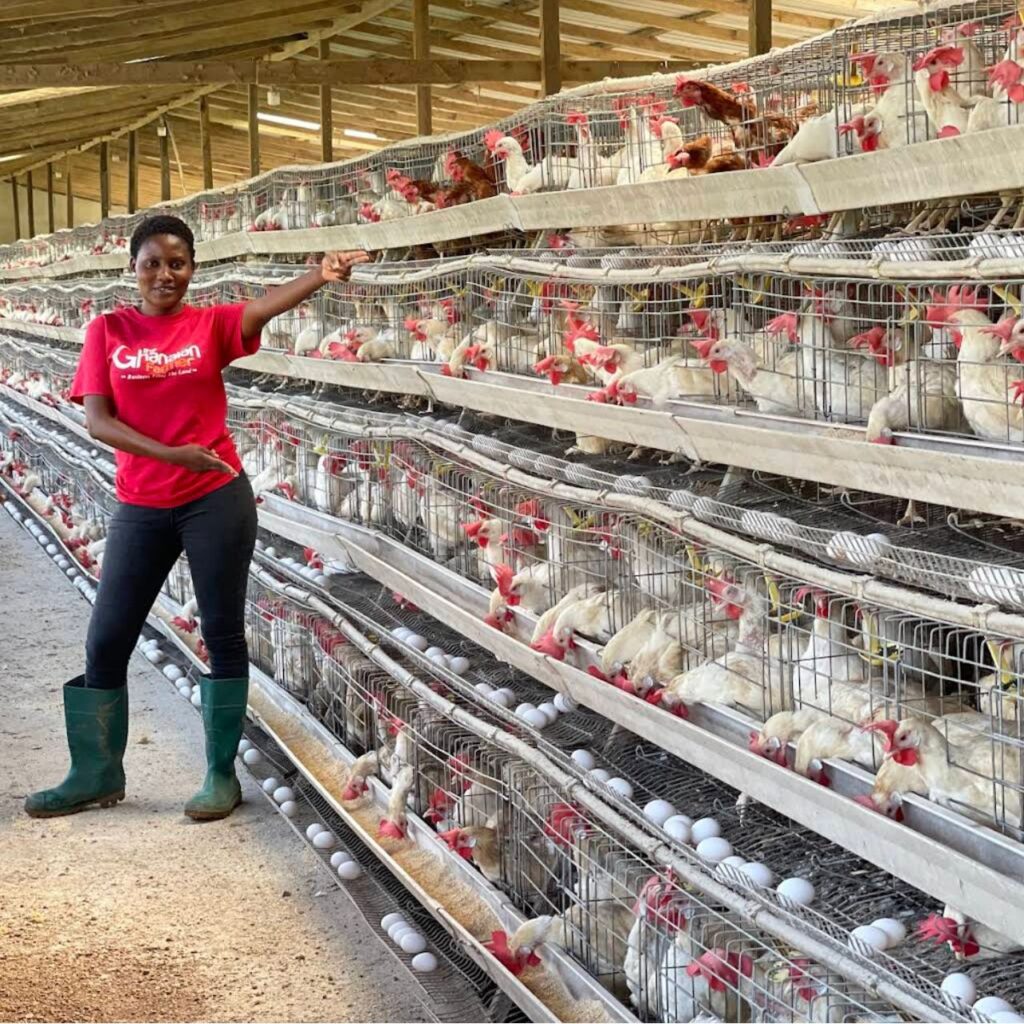
She has won many awards as a result of “The Ghanaian Farmer” project.
She added that “I am a solution-oriented journalist, and it is my duty to inspire and motivate others”. Enyonam describes that for the past 4 years, she and her team travel around all the 16 regions in Ghana to meet both commercial and small-scale farmers through the help of the various Regional Directors that connect them to the District Directors.
She explains that there are lots of opportunities in the Agric sector. “I have travelled to Johannesburg, Cape Town in South Africa, Rwanda, Turkey, and Canada, all thanks to the Ghanaian Farmer project. I have worked with organizations like World Food Programme, Solidaridad, Social Enterprise Ghana, MEST Africa, NBC Africa”.
Significance of Research:
She added that aside creating a platform to help farmers, we help them with the needed research. “Research helps you to know where to get your land, the test of the soil and the farming method necessary. No proper research means; you will experience post-harvest loss and you will not make money” – she said.
Empowering women:
Enyonam explains that agriculture is not cut out for men only. “Our main focus is on the young and aged women. “In each region, we partner with some women groups, listen to their needs and help find solutions”. She explains that “the aged women need fertilizers, seeds, to keep production going. For the young women, they want to know the opportunities in agriculture that they can explore. We enlighten them about the various opportunities in agriculture that they can leverage on.”.
Attracting investors:
Enyonam shares that when it comes to the several areas in agriculture that attracts investors, she advocates for them all including sustainable farming practices, technology and digital agriculture, climate change, women farmers to youth engagements. Enyonam highlighted that crop rotation or mixed farming is a key way of economically empowering the farmer.
“For a very long time, our farmers just produce one crop on their farms. But through our trainings and education on how to maintain the soil nutrients, there has been progress”. She added that “for climate, anytime we visit these farmers, we train them in changes in temperature, growing seasons, pests and diseases, among others”.
But I am very keen on helping farmers to get markets before they start farming, to regularize the farming venture and run it as a business. Farming without having buyers is what discourages people into farming”.
The way forward:
“We have a subsidiary organization which is a Non-Governmental Organization (NGO) called Young Farmers Development Organization (YOFDO). Our mission is to help bridge the gap between new farmers and existing farmers, to mobilize funding to support young people into agriculture, group them while addressing their diverse needs, and help them find their feet smoothly” – she said.
Enyonam narrates that she has no regrets. She added that the Ghanaian Farmer project has paved way for renowned journalists who are all into farming. She encourages whoever wants to venture into agriculture to make sure they have an off taker and have an agreement before producing.
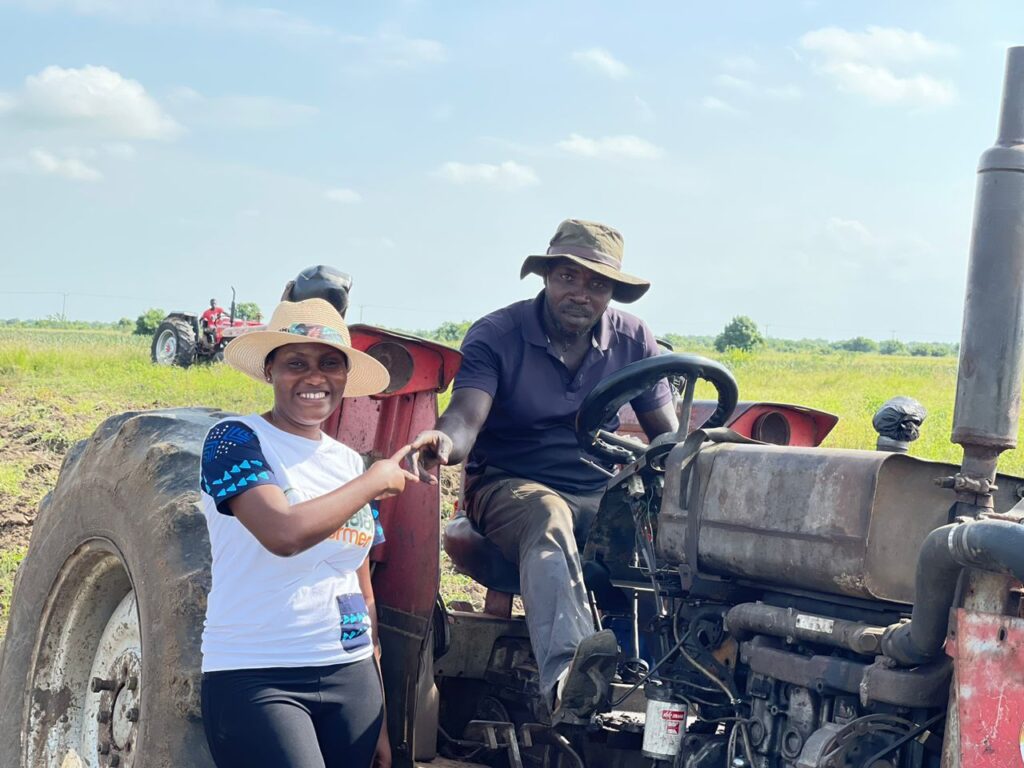
“The Ghanaian Farmer” project seeks to tell stories of local farmers and educate people about Agric.
Conclusion
Enyonam explains that until every young person develops love for agriculture or any space in the farming sector, she is not backing down. “Let me borrow a quote from the National Best Farmer for 2023 Madam Charity Akortia, ‘Agriculture is my business’, challenges may arise, but we need to keep going. Agriculture pays if only it is done right”.
-
WORLD PRESS FREEDOM: A PRESS FOR THE PLANET – Vice Versa Global
07.05.2024[…] Empowering Ghanaian Farmers: The Woman Behind the Movement […]

Leave a Reply